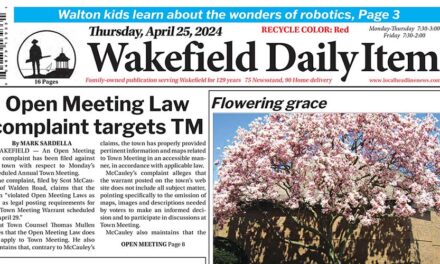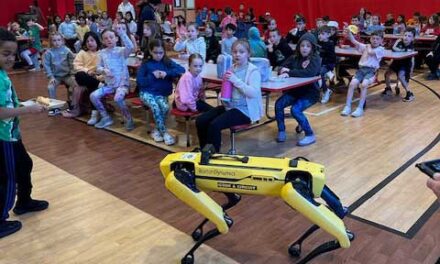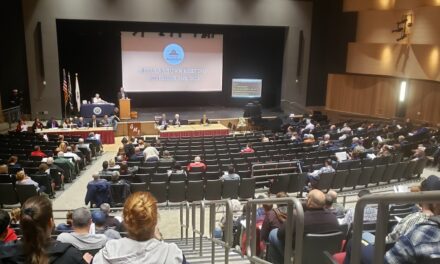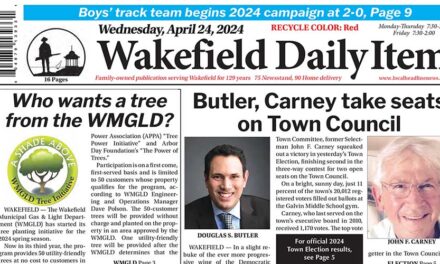Published in the November 4, 2016 edition.
WAKEFIELD — For those of you who may question whether Wakefield is ripe for voter fraud, Town Clerk Betsy Sheeran has a very simple answer: No, it isn’t.
Republican presidential candidate Donald Trump has repeatedly claimed over the course of the fall campaign that the 2016 election is “rigged,” telling his supporters to watch out for large-scale voter fraud — despite a lack of evidence that it exists.
Sheeran was asked to supply some answers to questions raised by engaged Wakefield citizen, Library trustee and Cristofaro Street resident Harold Regan in the days before early voting began Oct. 24.
1. What type of voting machines are used in Wakefield? How long has Wakefield used them?
Sheeran: AccuVote-OS are the voting machines that we use – Optical Scan System. They have been used for a least the past 12 years, if not longer
2. Are Wakefield’s voting machines in any way connected to the Internet and therefore subject to hacking?
Sheeran: The town’s voting machines are not at any time connected to the Internet.
3. Where are the voting machines stored?
Sheeran: Securely in the Council on Aging building.
4. Why are there two voter lists at each polling place (for checking in and checking out)?
Sheeran: To ensure the validity of the number of voters that have cast a vote – numbers are reconciled, required by State mandate.
5. What happens to the ballots after they are counted?
Sheeran: They are stored SECURELY for a period of 22 months, in accordance with the Secretary of State’s office
6. Are there a specific number of ballots printed?
Sheeran: The number of ballots received from the state is determined by the Secretary of State’s Elections Division.
7. What happend to the used ballots?
Sheeran: The numbers are reconciled with the number of voters who checked in (and out) – “spoiled” ballots are reconciled as well. All ballots are counted both before the polls open as well as after the polls close and used, unused and “spoiled” ballots are reconciled.
8. How are the ballots transported?
Sheeran: The Wakefield Police transport the ballots, both to and from the precincts. They also transport the voting machines. Everything is secure during transport.
9. Who counts the ballots and where?
Sheeran: This is done by the machines in each precinct and then compiled at the office of the Town Clerk in Town Hall.
10. What prevents someone from enrolling in multiple towns?
Sheeran: Anyone who moves from Wakefield and registers to vote in another municipality is removed immediately from Wakefield’s list of registered voters.
While there have been isolated cases of voter fraud in the U.S., there is no evidence of it being a widespread problem. In one study, a Loyola Law School professor found 31 instances involving allegations of voter impersonation out of 1 billion votes cast in U.S. elections between 2000 and 2014.
Over the course of the past few weeks, Trump has specifically raised concerns about people fraudulently voting by using the names of dead people. He cited research showing 1.8 million deceased people are still listed on state voter rolls, figures which were verified in a 2012 Pew report.
When asked directly at the final presidential debate if he would accept the election results, Trump refused, saying: “I will keep you in suspense.”
The Pew Center on the States issued a report in 2012 saying the nation’s voter registration system was “plagued with errors and inefficiencies that waste taxpayer dollars, undermine voter confidence and fuel partisan disputes over the integrity of our elections.” The report urged states to expand online voter registration and other online tools to allow voters to update their information, saying paper-based systems presented several opportunities for errors.
According to The Associated Press, Trump correctly cited Pew’s findings in that report, which found that approximately 24 million, or one of every eight, voter registrations were no longer valid or significantly inaccurate, and that more than 1.8 million deceased individuals were listed as voters. He also was correct in noting that approximately 2.7 million people have registrations in more than one state.
However, a majority of states have taken action in recent years to address concerns raised in the Pew report. The Pew report does not say that any of the inaccuracies led to a system that is vulnerable to widespread voter fraud.
In an update posted on its website recently, the Pew Center said election officials have worked to upgrade their voter registration systems.
The organization noted that 40 states now provide or have passed legislation allowing for online voter registration and 20 states have signed up for the Electronic Registration Information Center. That system is administered by the states and alerts election officials to cases in which a voter’s information may be out of date.
The system has contacted more than 4.5 million people who had moved but not updated their voter registration information, according to Pew.
Ohio is among the states that participate in the program. Ohio Secretary of State Jon Husted, a Republican, has said voter fraud is rare and has pushed back against Trump’s claims the election could be compromised. An estimated 515,000 deceased voters have been removed from Ohio’s registration records since Husted took office in 2011.
There have been isolated cases in which ballots have been cast in the name of a deceased individual, including two instances in 2012 in Husted’s Ohio.
In one case, a 54-year-old nun pleaded guilty to a charge of illegal voting after acknowledging she filled out an absentee ballot on behalf of a fellow nun who had recently died. The other involved allegations that a 75-year-old man had cast an absentee ballot on behalf of his recently deceased wife.
Experts say cases of voter fraud involving dead people are isolated. They also say it would be an inefficient way to rig a presidential election, given that the fraud would have to be conducted one voter at a time and would be effective only in places where the race is close enough that the outcome could be swayed.
There are more than 9,000 election jurisdictions nationwide and hundreds of thousands of polling places.
“Although entertaining, every time there are claims of hordes of dead people voting, those claims are debunked upon closer scrutiny,” said Wendy Weiser, head of the democracy program at the Brennan Center for Justice at NYU’s School of Law. “There has been no incident in recent memory in which people were able to impact an election by mobilizing fraudsters to impersonate dead people at the polls.”
Weiser said a more pressing concern is that living people are sometimes mistakenly identified as dead and removed from a state’s voter registration database, posing a challenge to them voting legally on Election Day.
—
The Associated Press contributed to this report.




